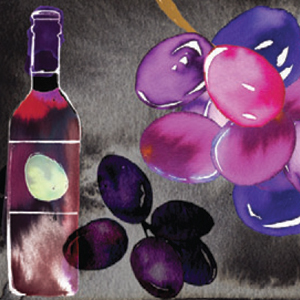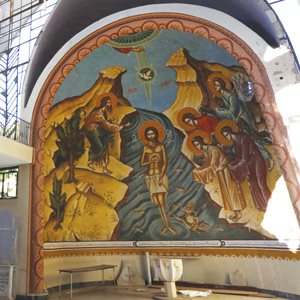The bell rang out from the Carmelite monastery in the Syrian mountains between Damascus and Homs. It would be audible to Islamic State (IS) jihadists, whose front line is less than three miles away. It said defiantly: “We are still here.”
The terrorists captured Qara, the local village, burnt the churches, dug up the Christian graves and scattered the bones. The friars and sisters had survived only by taking refuge in an old Roman tower where they were protected by Muslim friends. Now the village has been recaptured by the Syrian army.
Our small peace delegation was led by Mairead Maguire, who jointly won the Nobel Peace Prize in 1976 for her work for reconciliation in Northern Ireland. We were Catholic, Orthodox, Anglican, Hindu and agnostic. Our host was the founder of the monastery, the indomitable Mother Agnes. My priority was to be in contact with my fellow Christians, who often feel forgotten and unheard. It was a Damascene experience, demanding of me a conversion of heart and mind.
First of all, a conversion of the mind: I had unquestioningly accepted the dominant narrative of the West, that Bashar al-Assad is a monster who cold-bloodedly murders his own people and who must be got rid of as soon as possible. In Syria, we talked to politicians of all parties, imams, Christians, the mayors of local towns and people in the street. Some fervently supported their president. Others were critical, but everyone agreed that at this moment he was the key to Syria’s survival. Even his opponents accept that around 70 per cent of Syrians support Assad. Imposed regime change would bring chaos and the victory of terrorism, undermining Syria’s neighbours, Lebanon and Jordan, as the anarchy of Libya has brought instability to Egypt and Tunisia.
After a few days in Syria, it would be absurd to claim that I grasp the truth of this complex country. But to discover it, we must listen to every voice. Mairead Maguire learned in Northern Ireland that peace only comes when everyone is heard, even the terrorists.
I am not advocating a postmodern relativism, giving an equal validity to everyone’s story. We vigorously pressed people on explosive issues such as the use of barrel bombs. But the truth is to be arrived at with patience and humility. We celebrate the birth of the Prince of Peace, who summons us beyond easy and deceptive sound bites, such as the shameful claim of Prime Minister David Cameron that those who opposed the bombing of Syria are “terrorist sympathisers”.
Last February an editorial in Dabiq, the chilling propaganda tool of IS, explained the movement’s strategy of eliminating “the grey zone”. This is what lies between belief and unbelief, good and evil, the righteous and the damned. Are not our media and governments tempted by a similar elimination of the “grey zone”, polarising the world into the righteous and the damned? There will be peace in Syria only when the majority believe that their experience and aspirations are acknowledged. To refuse the grand mufti of Syria, who is known for his love of Christianity, a visa just because he is appointed by the Government is a form of censorship. The strength and weakness of Syria is precisely its ethnic and religious complexity. So Christ demands of us a humble conversion to the truth, in all its nuance, for “the truth will make you free” (John 8:32).
Secondly, a conversion of the heart: in Syria we saw that Christian and Muslim relationships can be more than mutual tolerance. They can be deeply loving. Syria’s senior Catholic, Gregorius III, the Melkite patriarch, is still filled with joy and vigour at the age of 83, and even performed a nifty little dance to express his joy at being with us.
He believes that Syria can offer something the West urgently needs: “The whole world is losing a model of living together, for we Muslims and Christians have been living together over 1,436 years, without wars, despite some disagreements and conflicts … but over the years peace and coexistence have outweighed controversy!” He would love to have a bishop visit Syria every month to witness the mutual joy that Muslims and Christians can have in each other. Episcopal readers please note!
In Qara, Muslims helped to rebuild the churches after the occupation by IS. The birth of Christ is celebrated in the mosque and the birth of the Prophet in the church. The Muslim women go to the monastery to make soap and clothes with the nuns. Together they make candles, very necessary with only four hours of electricity a day. In Tartus, we visited the first mosque to be dedicated to Our Lady, prayed the “Our Lady” and listened as the imam sang the Quranic sutra of Mary.
Europeans tend to see Christianity in the Middle East as a Western implant in alien Muslim soil. Syrians understand that both religions are native children of the land. It was in Antioch, in ancient Syria, that we were first called Christians (Acts 11:26). The murderous hatred of Christianity by IS is seen by many Syrians as an attack by foreigners on the heart of their national identity. A young woman composed a song protesting: “You can burn my churches and destroy my crosses but you cannot remove the sutra to Our Lady from the Quran.” The tragedy, of course, is the virtual disappearance of our older sibling, Judaism, from most of the Middle East.
But there was another more profound conversion of heart and mind. St Paul was on his way to Damascus, zealously hunting down Christians, when he heard a voice calling to him: “Saul, Saul, why do you persecute me?” (Acts 9:4). His conversion to Christ was a call to non-violence.
Syria is electric with violence. Leaving the hotel on our first morning in Damascus, I noticed a man toss his AK-47 on to the front seat of his taxi. Guns are omnipresent. Our sleep in the monastery was disturbed each night by artillery and gunfire just 50 yards away. We visited Maaloula, an ancient Christian village where Aramaic, the language of Jesus, is still spoken. It had been taken by terrorists, and then recaptured house by house. We visited the Church of St George, whose mosaic was pockmarked with bullet holes, and were on our way to breakfast when suddenly we were hastened into our cars and driven away at speed. Al-Nusra, an affiliate of al- Qaeda, had spotted our presence and an attack was imminent.
Of course IS must be resisted and defeated. But ultimately our enemy is violence itself. In Homs, we met Pere Michel and a Muslim sheikh who have practised “Mussalaha”, a process of reconciliation between the Syrian army and rebel forces, except, of course, IS. Michel said that negotiations were so tense that even a car backfiring could have unleashed carnage. Gradually the two forces drew closer. The army offered the rebels cigarettes and then everyone relaxed. After all, they were all Syrians.
We prayed at the tomb of the Dutch Jesuit, Frans van der Lugt, who refused to leave the city when the violence began in 2014. After a bombardment, he held the liturgy of Palm Sunday, attended by Catholics, Orthodox and Muslims. On 7 April 2014, someone walked into the garden and shot him dead.
The barbarous ferocity of IS hideously magnifies a violence that permeates Western culture. The American Academy of Paediatrics asserts that, by the age of 18, American teenagers will have witnessed on television alone 200,000 acts of violence and 16,000 murders. Often these are glamorised or treated as humorous. Western movies are the favourite viewing of jihadists. Violence pervades so much of Western culture, from computer games to the language of politics. The tragic murders in San Bernadino earlier this month were typical both of American gun culture and jihadist terrorism.
May this Christmas be a time of conversion in which we learn to seek the truth with humility, resisting the falsity of facile sound bites. May we learn not just to live with but to love other faiths. May our hearts and minds be healed of violence. (See Gerard Russell, pages 10-11.)
Fr Timothy Radcliffe OP is a consultor of the Pontifical Council for Justice and Peace.
17 December 2015, The Tablet
On the road from Damascus: searching for peace in Syria
Crisis in Syria
Edmund for England
 Loading ...
Loading ...
Get Instant Access
Subscribe to The Tablet for just £7.99
Subscribe today to take advantage of our introductory offers and enjoy 30 days' access for just £7.99





What do you think?
You can post as a subscriber user...
User Comments (0)